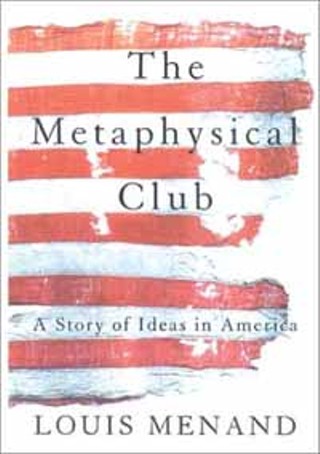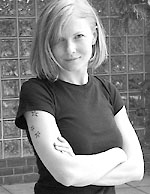Book Review: Readings
Louis Menand
Reviewed by Roger Gathman, Fri., June 8, 2001

The Metaphysical Club
A Story of Ideas in Americaby Louis Menand
Farrar, Straus & Giroux, 546 pp., $27
On October 21, 1861, Colonel Edward Baker, a friend of President Lincoln's, mounted a diversionary raid on Balls Bluff, Virginia. The 1,700 soldiers of the 20th Massachusetts were ferried across the Potomac, where they were supposed to climb a 100-foot bluff and advance upon an enemy about whose strength Baker, it turned out, was misinformed. Instead of a disorganized bivouac, the Massachusetts soldiers discovered the Confederates waiting for them in force. The battle started at two in the afternoon. By sunset the Massachusetts regiment had been forced to retreat. It emerged, however, that though the Union officers had some vague plan for advancing, they had made no plan for withdrawal. Baker, by this time, was dead, and hence, beyond blame. The Federal soldiers made their way down the bluff as best they could, under withering Confederate fire; and then, dodging Confederate cannonballs, they aimed at their small craft back across the river. In a mere five hours, the troop had taken a devastating 52% casualty rate. Lincoln supposedly wept at the news of Baker's death. Baker's superior, General Charles P. Stone, was arrested and jailed for his incompetence, while Congress investigated him. His superior, the ineffably inept General McClellan, remained untouched.
Among the wounded was the son of one of New England's most famous intellectuals. He was somehow dragged to a boat and ferried to an impromptu hospital. He regained consciousness at some point in his transit and, in an odd, authentically Puritanical bout of lucidity, he went over his beliefs, checking them, like an existential accountant, against his general feeling that he was dying:
... the reflection that the majority vote of the civilized world declared that with my opinions I was en route for Hell came up with painful distinctness. Perhaps the first impulse was tremulous -- but then I said -- by Jove, I die like a soldier anyhow -- I was shot in the breast doing my duty up at the hub -- afraid? No, I am proud -- then I thought I wouldn't be guilty of a deathbed recantation -- father and I had talked of that and were agreed that it generally meant nothing but a cowardly giving in to fear -- Besides, thought I, can I recant if I want to, has the approach of death changed my beliefs much? & at this I answered -- No -- Then came in my Philosophy -- I am to take a leap in the dark ...
This soldier later became arguably the most influential legal theorist America ever produced, Oliver Wendell Holmes Jr. The Holmes that tried and acquitted his own soul in a stinking farmhouse filled with dying men later tried matters of more national import in the comparatively less odorous precincts of the Supreme Court, where he served for almost 40 years. When he died, in 1935, two Civil War uniforms were found hanging in his closet with a note pinned to them. The note read, "These uniforms were worn by me in the Civil War and the stains upon them are my blood."
Between the battle and those two faded uniforms falls the intellectual history recounted by Louis Menand in this book. An intellectual history deals, obviously, with ideas. Notice, however, that neither the story of Ball's Bluff recounted at the beginning of this book, nor the inventory of Justice Holmes' closet, recounted at the end, are mental events. Louis Menand, a professor of English at the Graduate Center of City University of New York, and a contributor to The New Yorker and The New York Review of Books, gains an easy tone of authority in this book by expertly stitching argument to the messy, material circumstances of its production. Again and again, we see the fit between social events and the attitudes of thinkers. Not only that, Menand has a novelist's eye for selecting intrinsically dramatic detail -- for finding, in other words, the pathos in objects. Those coats, for instance, could easily have come out of a Chekhov short story.
The Metaphysical Club was not the Vienna Circle -- it was not a self-conscious groupuscule of philosophers trying to change the way philosophy is done. It was, instead, a discussion group that ran throughout 1872, and included William James, Oliver Wendell Holmes Jr., Charles Sanders Peirce, and, as the pivotal figure in the group, Chauncey Wright. Wright is forgotten today because he was not a writer. He was, however, a brilliant talker. Employed by a weather bureau to make charts for sailors, he saw weather as a perfect model for how events really occur in the world -- prefiguring, by one hundred some years, complexity theory. Similarly, Wright thought that, as Menand puts it, "the world is characterized, through and through, by change, and that our knowledge of it is characterized, through and through, by uncertainty."
Such a philosophy would naturally be hospitable to Darwinism. On the Origin of the Species was published in 1859; by a chronological accident, Darwin's reception, in the United States, was loosely bound up with the experience of the war. For people who had seen what laying down a regular fire of minié balls does to soldiers charging in close quarters, the idea that chance, variation, and adaptation to environment, rather than intelligent design, determines the forms of life, was not a great stretch. In some ways, as Menand shows, Americans were quicker to understand Darwin's underlying message than the British. In England, even Darwin's greatest adherents thought they detected a direction in evolution, a progress from low to high. They were, in other words, still under the thrall of an earlier version of evolution, Lamarck's.
But Menand's pragmatists -- Peirce, James, Holmes, and John Dewey (who Menand includes in this account although Dewey was not a member of the Metaphysical Club; he was only 13 years old in 1872) -- saw that natural selection had nothing to do with progress. These men, who were intimate with the panjandrums of the older culture (James, Peirce, and Holmes were all sons of famous intellectual fathers), had absorbed the de-Christianizing influence of Emerson, but Darwin, as these thinkers quickly recognized, went much further than a simple Voltairian refusal to countenance irrational appeals to providence.
Under the influence of Wright and Darwin, the pragmatists took another step -- they embedded formerly logical categories, like truth and belief, in action. This step broke the "mirror of nature" which philosophers from Plato on down had postulated -- that separation between mind and world in which mind primarily "represents" the world.
I am, of course, stripping away the rich accretion of social fact in which Menand's thinkers really lived to get to their thoughts. Our interest, however, is as much in the way these thoughts circulated in different disciplines -- from education to law -- as in how they were doctrinally formulated. This is the tricky part of intellectual history. Menand seemingly has no trouble with it. This combination of a mandarin intelligence which has read all the books and a journalistic taste for pungent faits divers is reminiscent of Edmund Wilson. Reading Menand's book, I was struck again and again by how much fun it was; how aptly Menand summarized the ideas of complex thinkers, sometimes (particularly in Charles Sanders Peirce's case) better than they did themselves; and how, insensibly, the book's interpretation and tone came to seem not only correct, but canonically correct, as though what I was reading was instantly orthodox. Like Wilson's To the Finland Station in the Thirties or Hoftstadter's The American Political Tradition in the Forties, Menand has created an unavoidable exegesis. Any future historian who writes about 19th-century American culture will have to either go around Menand, or through him, but there's no ignoring him.










